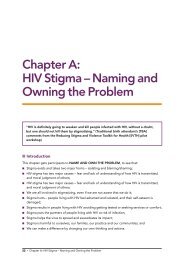Implementing Multiple Gender Strategies to Improve HIV and ... - ICRW
Implementing Multiple Gender Strategies to Improve HIV and ... - ICRW
Implementing Multiple Gender Strategies to Improve HIV and ... - ICRW
You also want an ePaper? Increase the reach of your titles
YUMPU automatically turns print PDFs into web optimized ePapers that Google loves.
empowers them <strong>to</strong> make healthier choices. For girls ages 9–13, a girl’s club<br />
offers training in income-generating “household activities,” such as making<br />
soap or c<strong>and</strong>les, sewing, <strong>and</strong> knitting. Older girls (14–19) can attend<br />
sewing classes where they learn <strong>to</strong> make the ana<strong>to</strong>mical dolls used in the<br />
<strong>HIV</strong> education <strong>and</strong> awareness training. The girls are paid based on quality<br />
production of the dolls. The project also organizes apprenticeships within<br />
the training center, with, for example, the accountant, the sewing teacher,<br />
or the bread teacher. This provides a substitute teacher if a regular teacher<br />
leaves, while also training the girls in marketable job skills.<br />
The SSTOP program manual also provides basic health <strong>and</strong> safety/first aid<br />
training so that women can take control of their own health. It also includes<br />
information about family law <strong>and</strong> women's rights <strong>to</strong> increase girls’<br />
awareness of legal protections for women.<br />
In addressing gender-based violence, a separate self-defense course,<br />
offered in two three-hour sessions, covers what <strong>to</strong> do when a girl can fight<br />
back (a situation with a thief, in<strong>to</strong>xicated person, etc.) as well as when she<br />
may not be able <strong>to</strong> physically fight back (such as when dealing with a<br />
policeman, teacher or family member). In the latter case, girls are shown<br />
how <strong>to</strong> "talk your way out of the situation" rather than physically fight back.<br />
This course also covers the process of filing a police report in an abusive<br />
situation with a man <strong>and</strong> recommends organizations that support women<br />
who have been raped or sexually abused. Men are never permitted <strong>to</strong><br />
participate in this course.<br />
Target Audience<br />
Adolescent girls, ages 14–19 who are responsible for caring for younger<br />
siblings, <strong>and</strong> other disadvantaged girls<br />
Level of Intervention • Community<br />
• District<br />
Geographic<br />
Location<br />
Timeframe<br />
Chimoio district/city of the Manica province, Western Mozambique<br />
June 2006–ongoing<br />
Funders<br />
The U.S. President’s Emergency Plan for AIDS Relief (PEPFAR)<br />
Partner<br />
Organizations<br />
Implementation partners:<br />
• Church World Service<br />
• Columbia University<br />
• Foundation for Community Development (FDC)<br />
• Health Alliance International (HAI)<br />
• Peace Corps<br />
• Population Services International (PSI)<br />
Evaluation partners:<br />
• Ilene Speizer, Department of Maternal <strong>and</strong> Child Health, University of<br />
North Carolina School of Public Health, Chapel Hill<br />
84
















